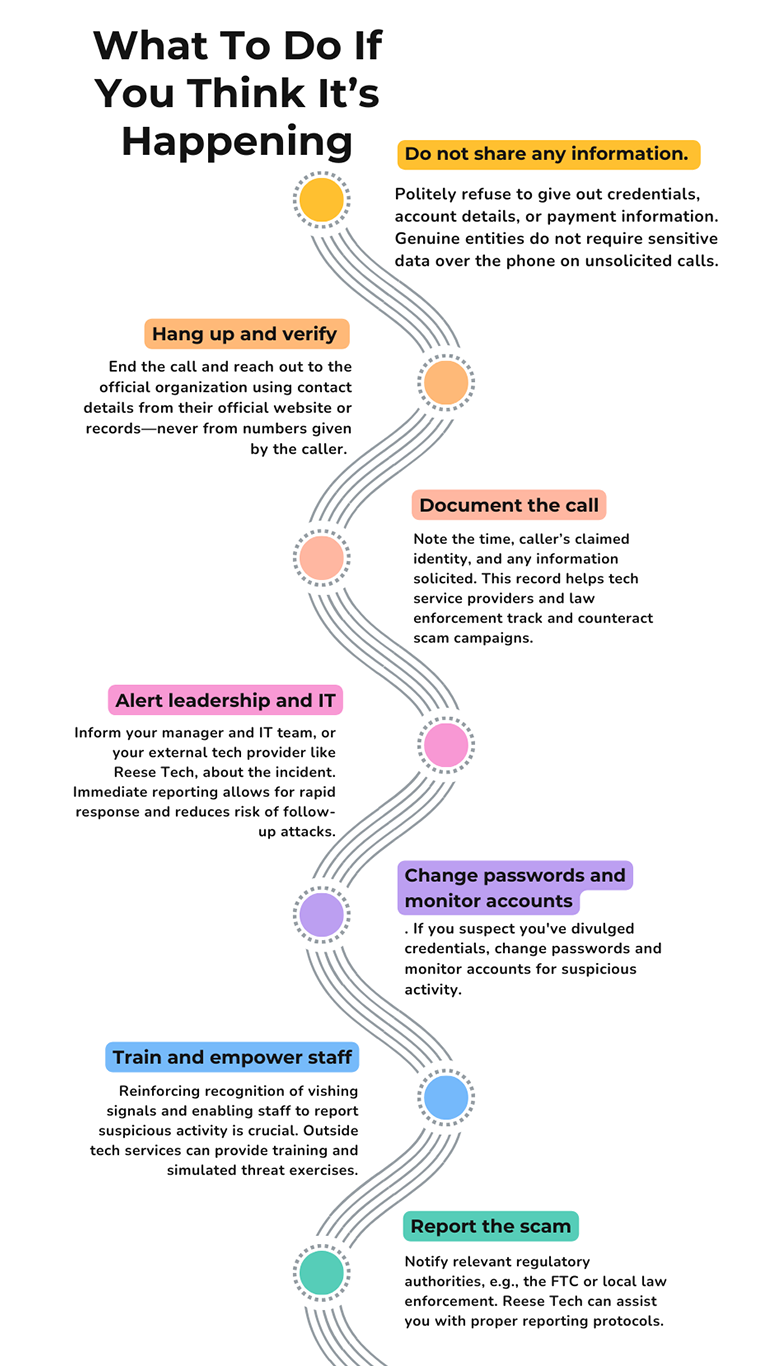Voice phishing, often called vishing, is a rapidly growing cyber threat where scammers use phone calls to trick individuals and small businesses into sharing sensitive information, such as passwords, credit card numbers, or company secrets. Unlike email phishing, which most people are familiar with, vishing exploits the trust and urgency of a phone conversation, making it more difficult to detect and prevent—especially as modern technology enables attackers to use caller ID spoofing, voice-altering software, and even AI-driven impersonation tactics.
As small businesses increasingly rely on phone communication and remote support, the risks posed by vishing grow. Without expert guidance and robust technical controls, even experienced employees can fall victim to deceptive callers. Engaging an outside tech service like Reese Tech strengthens your defenses, providing you with the training, monitoring, and technical safeguards needed to spot and stop voice phishing before costly damage occurs.
What is Voice Phishing?
Voice phishing, or vishing, is a form of social engineering where fraudsters impersonate trusted figures—such as bank officials, IT support technicians, or government agents—over the phone, aiming to extract valuable information. Attacks may be conducted through live callers or automated robocalls. Sometimes, scammers leave voicemail messages urging targets to call back a number, which connects them directly to the perpetrator.
Key characteristics:
- Caller ID Spoofing
- Attackers manipulate caller ID to display legitimate-looking numbers.
- Urgency and Threats
- Scammers often use scare tactics, claiming that accounts are compromised or that legal action is imminent.
- Trusted Institution Impersonation
- Calls frequently claim to be from banks, tech support, law enforcement, or government agencies.
- Extraction of Sensitive Data
- Scammers typically request information such as passwords, credit card details, or employee credentials.
Because these calls seem urgent and official, targets are likely to respond impulsively. For small businesses, the fallout can be severe, resulting in financial theft, data breaches, or compliance failures.
How to Spot a Voice Phishing Attempt
Recognizing vishing is challenging, but there are clear warning signs. Reese Tech routinely trains small business clients to identify and react to these markers, dramatically reducing risk.
Red flags include:
- Unsolicited Calls from Alleged Officials
- Banks, government agencies, or tech support will rarely initiate a surprise call requesting sensitive information.
- Requests for Personal/Company Data
- Legitimate organizations don’t ask for security credentials, passwords, or payment details over the phone—especially not on an unsolicited call.
- Urgency or Threats
- If the caller pressures you to act quickly, threatens negative consequences, or demands secrecy, it’s almost certainly a scam.
- Caller ID Manipulation
- A local or familiar-looking number is not proof of legitimacy—modern scams frequently use caller ID spoofing tools.
- Grammar, Accent, or Script Issues
- Many vishing calls originate from overseas call centers. Be cautious if the caller’s language or accent is inconsistent with the claimed organization.
- Callback Numbers/Voicemail Requests
- Scammers may leave voicemails insisting you return their call, often to a different number than you’d expect.
- Links or References to Web Pages
- Some vishing attacks prompt you to visit phony websites or click on malicious links sent via text or email during the call.
These techniques are designed to defeat even cautious employees. That’s why periodic awareness training and robust technology controls—such as VoIP monitoring and call filtering—are essential for small businesses. Reese Tech specializes in deploying and maintaining such defenses.
What to Do if You Think It’s Happening
If you suspect you’re receiving a vishing call, use professional diligence. Reese Tech advises small businesses to adopt these steps immediately:
- Do not share any information.
- Politely refuse to give out credentials, account details, or payment information. Genuine entities do not require sensitive data over the phone on unsolicited calls.
- Hang up and verify.
- End the call and reach out to the official organization using contact details from their official website or records—never from numbers given by the caller.
- Document the call.
- Note the time, the caller’s claimed identity, and any information solicited. This record helps tech service providers and law enforcement track and counteract scam campaigns.
- Alert leadership and IT.
- Inform your manager and IT team, or your external tech provider like Reese Tech, about the incident. Immediate reporting allows for rapid response and reduces the risk of follow-up attacks.
- Change passwords and monitor accounts.
- If you suspect you’ve divulged credentials, change passwords and monitor accounts for suspicious activity.
- Train and empower staff.
- Reinforcing recognition of vishing signals and enabling staff to report suspicious activity is crucial. Outside tech services can provide training and simulated threat exercises.
- Report the scam.
- Notify relevant regulatory authorities, e.g., the FTC or local law enforcement. Reese Tech can assist you with proper reporting protocols.

For businesses, outsourcing these responsibilities to a trusted tech partner like Reese Tech means that cyber response and employee training don’t fall solely on your shoulders. Reese Tech can implement real-time call screening, keep your staff aware of the latest scam trends, and maintain up-to-date security policies.
Why Small Businesses Need External Support
Small businesses face disproportionate risk from voice phishing because most lack specialized security teams. Attackers know that a single successful call can breach company systems, expose customer data, and result in costly fraud or fines.
By partnering with a technology service provider like Reese Tech, you benefit from:
- Proactive monitoring
- Detection of scams and unusual call activity before a breach occurs.
- Employee education
- Regular training sessions and simulated phishing calls to improve team preparedness.
- Incident response
- Rapid intervention in case of a suspected or confirmed attack.
- Policy development
- Comprehensive phone and data security policies customized for your business.
- Technology tools
- Deployment of advanced call screening and VoIP security measures.
A strong outside tech partner greatly increases your business’s ability to spot and thwart these threats efficiently, saving you financial losses, reputational harm, and compliance headaches.
Protect your business and your employees
Voice phishing is a sophisticated threat that is on the rise. Spotting scam calls and knowing how to react is essential, but it’s not enough. Having an expert like Reese Tech managing your cybersecurity is the most reliable way to reduce risk and recover quickly if a vishing attempt targets your organization. Investing in external support ensures you’re not left exposed and helps build a culture of vigilance that protects your reputation and your bottom line.

